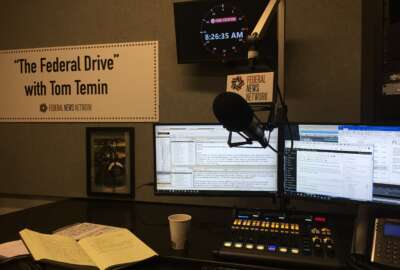Telework, or ‘tele-goofing off?’ Mixed agency messages show stigma still exists
Agencies have offered mixed messages about telework and the flexibilities their employees have in balancing the coronavirus pandemic, childcare duties and family...
The president has asked Americans to avoid gatherings of 10 people or more, an unprecedented public response in effort to slow the spread of the coronavirus.
Yet some federal employees are still asked to come to the office, gathering in groups far larger than 10 people. Some are receiving telework guidance from their agencies, but it’s changing constantly.
And the messages range widely in tone.
Some agencies have offered definitive answers on telework over the past week, especially with more strongly-worded memos from the Office of Management and Budget.
NASA and the Merit Systems Protection Board are among the agencies that implemented mandatory telework for all employees this week.
The Consumer Financial Protection Board on Tuesday night expanded mandatory telework to employees in all locations. The agency will give employees up to 20 hours of administrative leave per pay period to account for time spent caring for children or family members, CFPB Director Kathleen Kraninger said Tuesday in an email to the workforce.
But other agencies have offered mixed messages about telework and the flexibilities their employees have in balancing the coronavirus pandemic, childcare duties and family medical concerns — and their work and services to the public.
Their responses show how ill-prepared agencies are to a handle a major crisis, especially one that may invoke continuity of operation plans (COOPs), said Jeff Neal, a former chief human capital officer for the Department of Homeland Security.
“They have not been trained to deal with issues like this,” he said. “For some agencies, frankly, COOP planning is considered to be a silly exercise because it’s something you have to do to comply with the law.”
The messages vary from tone deaf and confusing to well-meaning and overly-stoic, or some combination of all of the above.
“The telework messaging has been accompanied by underhanded comments like, ‘remember you are still on the clock,’ and, ‘you are expected to still be working and available.’ Of course we know that! Messaging like this shows there is still a stigma to teleworking,” a Census Bureau employee wrote in an email to Federal News Network.
Standard telework policies slow to adapt to new circumstances
Many school districts across the country are closed in effort to prevent the spread of the coronavirus, but some agencies haven’t eased up their telework policies to reflect the new reality.
The Agriculture Department, for example, told employees to account for any time spent taking care of small children or other dependents during the work day. Employees must take unscheduled leave during those hours, the department said Sunday.
“Telework is not a substitute for dependent care,” USDA’s guidance reads. “However, USDA’s telework directive does not preclude a teleworking employee from having a caregiver in the home who provides care to the dependent(s) while the employee teleworks. Also, a dependent may be permitted in the home provided they do not require constant supervision or care (i.e., older child or adolescent) and their presence does not disrupt the ability to telework effectively.”
Contrast the USDA response with one from DHS, which told supervisors to waive standard telework restrictions, including the prohibition on employees working while caring for their children at home.
“Supervisors should work with each employee on a case-by-case basis to understand the employee’s situation and ensure maximum operational readiness,” Tex Alles, DHS’ deputy undersecretary for management, said Friday in new guidance to employees. “This may entail teleworking split shifts or non-standard hours, or mixing telework and leave within a shift, but DHS will have more success achieving its overall mission as well as employee confidence by being flexible versus being overly stringent in this particular situation.”
Neal described the mixed agency responses to telework as “bureaucracy at its best.”
“Agencies will often say telework is not a substitute for child or dependent care,” he said. “That’s perfectly reasonable. However, that is in normal, every day operations. This is not normal. An agency that is trying to impose a normal standard on telework right now is deluding themselves.”
Managers, meanwhile, fear they’ll be accused of making the wrong decision in granting telework or leave requests. Or they haven’t traditionally been empowered to make these decision on their own, said Chad Hooper, president of the Professional Managers Association, which represents IRS supervisors.
When suddenly asked to decide on their own, some managers and supervisors are stuck.
“We’re talking about that civil servant culture that needs to change,” Hooper said. “That kind of follow-the-leader attitude doesn’t work when we need to deal with a novel issue.”
Stigmas around telework persist
USDA on Sunday told supervisors to develop plans for “maximum telework” starting this week.
But two USDA employees have said few are actually teleworking full time.
Managers have been told not to put specific telework plans in writing, one employee said, so supervisors are holding calls with large groups to give instructions and answer questions, which they often can’t directly answer.
Instead, the message from top USDA leadership is, “business as usual,” both USDA employees said.
“This is clearly not business as usual,” one employee said.
The stigma around telework clearly still exists at the department, the employees said. USDA was one of the first agencies to make broad cuts to its telework program in 2018.
“There are a lot of people who hate telework,” Neal said. “There are lots of managers who think telework is tele-goofing off and that nothing will get done.”
But there’s no room for a stigma during a pandemic, one USDA employee said. The situation is frustrating and stressful for employees and managers alike, who fear they’re putting others in harm’s way by “doing nothing.”
“Clearly USDA has to continue providing vital services such as food deliveries to those in need or meat inspections during this time of crisis, but the same level of physical presence is hardly required in all agencies indiscriminately,” one employee told Federal News Network. “Is the private sector to pay all the price of slowing down the pandemic while the public sector continues to propagate the virus? Are certain agency employees more worthy of protection than others? Are the leaders of the agencies unwilling or unable to put aside political considerations or career aspirations to let their internal compasses guide them?”
Guidance changing daily at SSA
At the Social Security Administration, where its employees and unions have been especially vocal about the agency’s coronavirus response, messages and guidance have changed almost daily.
SSA announced plans to close field offices Monday evening, which came as a surprise to several employee unions who said the agency made no mention of those plans during a call with labor relations management earlier that same afternoon.
When asked whether employees in SSA’s shuttered field offices were allowed to work remotely, an agency spokeswoman said: “In general, to the extent possible, employees are performing their work on telework.”
“In order to protect the people we serve — older Americans and people with underlying medical conditions — as well as our employees, Social Security offices, including hearing offices, are closed to the public but open to employees who, when possible, are reporting to the office to handle critical workloads,” Nicole Tiggemann, an agency spokeswoman, said in an email. “For scheduled hearings, we will hold telephone hearings if the claimant and representative agree to a telephone hearing.”
Throughout other parts of the agency, SSA employees have said they’ve received some verbal guidance to telework but nothing in writing.
Copyright © 2025 Federal News Network. All rights reserved. This website is not intended for users located within the European Economic Area.
Nicole Ogrysko is a reporter for Federal News Network focusing on the federal workforce and federal pay and benefits.
Follow @nogryskoWFED






